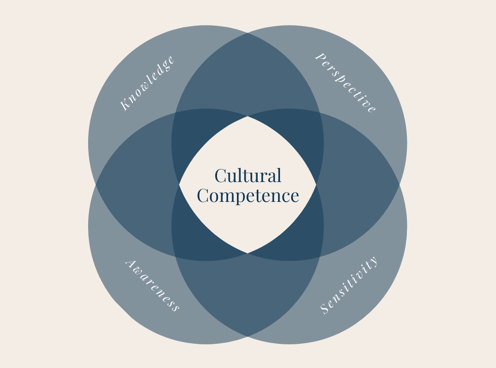What is Cultural Competence?
Learn about Cultural Competence and how to develop. Cultural competence is a skill needed to navigate our globalized society.
PERSONAL DEVELOPMENT
Andy
Our years of experience from working, living, and exploring different cultural environments resulted in the below learnings that we would like to share with you.
The information provided here could be useful for those who wish to understand and work with other cultures, living abroad or in general wish to develop cultural competence.
Cultural Competence refers to the ability to effectively interact with people from various cultures.
It consists of the following elements:
Cultural Knowledge
Cultural Awareness
Cultural Sensitivity
Cultural Perspective
and it is a continuous and lifelong learning journey.
Building Cultural Competence


Cultural Knowledge
Refers to one's knowledge of their cultural counterpart's cultural practices and customs, and how these are portrayed in social interactions.


Cultural knowledge could be said to be the outset of exploring a new culture. It is all about acquiring information about others’ values, norms, history, behavior, and beliefs. As expected cultural knowledge without the skill of how to apply it in practice will have little value but that should not diminish the time that needs to be dedicated in developing cultural knowledge for a particular culture.
Cultural knowledge is all about how your mind works to process information; what resources you have at your disposal, and what factors shape your decisions. With the abundance of information about cultures available, today is more about finding a reliable source and the preferable way for you to learn and acquire knowledge. The plethora of sources to get cultural knowledge now is greater than ever. When you’re beginning your search for cultural knowledge, you might want to check some of the online tools such as online libraries. Alternatively find people in your social network or community who might have knowledge on a particular culture.
Apart from acquiring knowledge to begin the cultural competence development journey once you start interacting with a new culture, you will discover that Cultural knowledge can be used as a direct connection to other people. As the famous quote goes "Knowledge is Power" and that is certainly also true for cultural knowledge in developing cultural competency.
Cultural Awareness
Refers to recognizing and understanding one's cultural differences.


Cultural awareness is the appreciation of cultural diversity and the diverse aspects of human culture and is an indispensable feature of contemporary quality of life. In order to thrive in a complex and interconnected world, people need to live in cultural resonance with their environment.
Cultural awareness development starts with self-awareness; understanding how our own culture influences our values and behaviors. This is crucial because how we interpret a new culture really depends on how we see that culture from our own cultural lenses. When you are taking this self-reflection and exploration about your own cultural values and behavior, the focus is on understanding how your own cultural biases and stereotypes affect your judgment on how you see another culture.
Being culturally aware and be able to understand yourself and others can be very useful in avoiding mistakes and interacting with other cultures.
Cultural Sensitivity
Refers to knowing what one should expect from one's cultural counterpart, and how one should respond to these expectations.


Cultural Sensitivity is the task of caring about the beliefs, attitudes, and practices of others—particularly one's culture—and choosing to behave in a way that communicates the most appropriate and sympathetic response to their needs and preferences. It includes taking actions to ensure that one's culturally sensitive behavior is clear, consistent, and obvious to everyone with whom one is interacting. It is hard to have effective Intercultural Communication without having Cultural Sensitivity and this is why Cultural sensitivity is one of the key elements when developing cultural competence.
It is so important because can often lead to the best of relationships. "Cultural sensitivity" can be defined as: "The awareness and sensitivity of one to another's diversity of values and beliefs; whether one is experiencing identity, growth, or empowerment within a different culture. It also refers to one's capacity to effectively interact with people of different cultures and who may not share the same beliefs, traditions, values, experiences or preferences."
When considering developing your cultural sensitivity, a good place to start is to practice addressing some of the common characteristics in a culture, such as respect, fairness, cooperation, comfort, and kindness. Having an awareness of specific characteristics associated with each culture it is overall important, but the above characteristics can be said to be common as they address basic and universal human needs. As every individual is different and also how the behavior of a person might change from day to day when you develop cultural sensitivity you are actually developing a way of identifying how your counterpart wishes to be treated. There is no such thing as a standard way on how to interact with a specific culture, and actually, this is not even the right mindset to have - meaning to try to find one solution that fits all which you can apply to a specific culture- because that will unavoidably lead you creating biases towards a specific group of people or that specific culture thus reaching opposite results from those you aimed for.
Cultural Perspective
Refers to the skill to navigate and see with the counterparts’ eyes.


Cultural Perspective can be said to be one of the ambitions or results of Cultural Competence development. It is a skill in the psychological process that involves the interpretation of non-verbal and conceptual cues and understanding the intentions behind the non-verbal cues, as well as making inferences based on the content of non-verbal signals. In fact, applying Cultural Perspective is placing Cultural Awareness, Cultural Knowledge, and Cultural Sensitivity into practice.
Sometimes, two cultural perspectives are opposite to each other. So when you are developing a cultural perspective it is more useful than you start to think and reflect in a more positive light rather than neutral. This will help you allow easier perspective-taking and accommodate an understanding of this other way of seeing things - through your counterpart lenses.
Cultural perspective is a significant component of critical thinking and is considered essential in applying cross-cultural communication.
